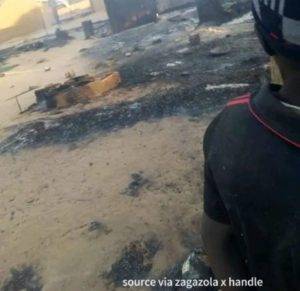The tranquility of Gurjaje and Malari villages in Yobe State was shattered on Monday as Fulani herdsmen launched a reprisal attack, leaving the residents in a state of shock and trauma. According to eyewitnesses, the herdsmen, armed with bows, arrows, and machetes, rode into the communities on motorcycles, setting ablaze several housing units in what appears to be retaliation against the villagers.
Zagazola Makama, a renowned counterinsurgency expert and security analyst in the Lake Chad region, shed light on the incident, indicating that the attack stemmed from a previous altercation between the herdsmen and the villagers. The conflict reportedly began in January when the villagers resisted the encroachment of Fulani cattle onto their watermelon farms. This resistance allegedly led to the rustling of some cattle belonging to the herdsmen, further escalating tensions between the two parties.
Fulanis herdsmen Escalating Tensions: Background and Motivations
The recent reprisal attack underscores the escalating tensions between farmers and herdsmen in Nigeria, particularly in regions like Yobe State. The conflict, often fueled by disputes over land use and resources, has claimed numerous lives and displaced countless individuals over the years. In this instance, the destruction of watermelon farms served as the catalyst for the violent confrontation, with both sides claiming grievances against each other.
The lack of resolution mechanisms and the absence of effective law enforcement exacerbate the cycle of violence, leaving communities vulnerable to reprisal attacks and retaliatory actions. Despite efforts by local authorities to mediate conflicts and promote peaceful coexistence, the root causes of the tensions remain unaddressed, perpetuating a cycle of violence and destruction.
Uncertain Future: Seeking Justice Amidst Loss
As the affected communities grapple with the aftermath of the attack, questions linger about the path to justice and reconciliation. With no arrests made in connection with the incident, the distraught farmers are left to reckon with their losses while fearing further reprisals. The lack of accountability and the failure to hold perpetrators accountable only deepen the sense of insecurity and mistrust among residents, undermining efforts to foster peace and stability in the region.
Moving forward, there is an urgent need for comprehensive strategies to address the underlying grievances fueling conflicts between farmers and herdsmen. This includes investing in conflict resolution mechanisms, promoting dialogue and understanding between communities, and enhancing security measures to prevent further escalation of violence. Without meaningful intervention and sustained efforts to address the root causes of these conflicts, the cycle of reprisal attacks and communal violence is likely to persist, perpetuating a cycle of suffering and destruction for all involved.
Suspected Fulani Herdsmen Incite Heightened Insecurity Across Nigeria
Suspected Fulani herdsmen have been implicated in a series of violent acts across various regions of Nigeria, including killings, abductions, and rapes. This escalation in violence has left communities in a state of fear and insecurity. Reports indicate that the Fulani herdsmen, known for their nomadic lifestyle, have been involved in clashes with farmers and other locals over grazing rights and the protection of their cattle. These conflicts have resulted in tragic loss of lives and widespread devastation.
Roots of Conflict and Government Response
The Fulani herdsmen in Nigeria are characterized as fiercely protective of their cattle, often resorting to violence when their livelihoods are threatened. Their cultural practices, including the reverence for their cattle, contribute to tensions with local communities. While the government has been called upon to intervene and address the security challenges posed by the Fulani herdsmen, effective solutions have remained elusive.
The persistent failure to curb the violence perpetrated by these groups raises concerns about the government’s ability to maintain law and order, and ensure the safety of its citizens. It is imperative for authorities to take decisive action to quell the violence and restore peace to affected regions, as the continued escalation of conflicts poses a significant threat to the nation’s stability and security.
Table of Contents
Discover more from OGM News NG
Subscribe to get the latest posts sent to your email.













